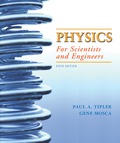
(a)
Whether the given statement is true or false.
(a)
Answer to Problem 1P
This statement is true.
Explanation of Solution
Given:
Vectors
Formula Used:
Vector product is:
Calculation:
As vectors are in opposite direction,
Conclusion:
Thus, the given statement is true.
(b)
Whether the given statement is true or false.
(b)
Answer to Problem 1P
This statement is false.
Explanation of Solution
Given information :
Two vectors,
Formula Used:
Vector product is:
Calculation:
The cross product of
Conclusion:
Thus, the given statement is false.
(c)
Whether, the given statement is true or false.
(c)
Answer to Problem 1P
This statement is true.
Explanation of Solution
Given information:
Magnitude of vector product of two non-zero vectors is known. Also, the magnitude of each vector is known.
Formula Used:
The angle between two vectors can be found as follows:
Calculation:
From the given information, the angle can be found. Hence, the given statement is true.
Want to see more full solutions like this?
Chapter 10 Solutions
Physics for Scientists and Engineers
- Which of the following statements is true about the relationship between the dot product of two vectors and the product of the magnitudes of the vectors? (a) AB is larger than AB. (b) AB is smaller than AB. (c) AB could be larger or smaller than AB, depending on the angle between the vectors. (d) AB could be equal to AB.arrow_forwardFind the angle between vectors for (a) D=(-3.0i-4.0j)m and A=(-3.0i+4.0j)m and (b) D=(2.0i+4.0j+K)m and B=(-2.0i+3.0j+2.0K)m .arrow_forwardIf the dot product of two vectors vanishes, what can you say about their directions?arrow_forward
- In this problem we are going to consider two different examples of the dot product between two vectors, a force F and a displacement delta r.  (a) if the force vector has a magnitude of F= 19 N, The displacement has a length of deltas=1.2 m, and the angle between the vectors is 35°, what will the dot product between the vector F and the vector delta r be? You can answer in Joules (which is the same as Newton meters) . (B) if the force vector has components fx =8.5 N and F y=12 N,  and the displacement factor has components delta rx=0.15 m and delta ry=0.61m, what is the dot product between them? Again, enter the answer in joules. arrow_forwardThe angle between two vectors is u. (a) If u = 30.0o, which has the greater magnitude: the scalar product or the vector product of the two vectors? (b) For what value (or values) of u are the magnitudes of the scalar product and the vector product equal?arrow_forwardrection: Calculate the following. (Three points each) 2. Sam has measured the end points of two poles, and wants to know the angle between them: 1. Calculate the dot product of vectors a and b: (11,5,8) A (3.60 m) a (4,8,2) az k 70.0 30.0 () ax y B (2.40 m) ay 3. Vector a has magnitude 3, vector b has magnitude 4 and the angle between a and b is 60°. What is the value of a. b.? 4. Vector a has magnitude 3v2, vector b has magnitude 5 and the angle between a and b is 135°. What is the value of a. b.? 5. What is the size of the angle between the vectors a = (2, 5, -1) and b = (-3, 2, 6)?arrow_forward
- Situation 3. For the points O, A, and B: (a) what is the cross product řoa x řOB: (b) determine a unit vector that is perpendicular to roa and foB; and (c) use the cross product to determine the length of the shortest line from point B to the straight line that passes through points O and A. B (4, 4, –4) m FOB "OA А (6, -2, 3) marrow_forwardTwo vectors in Cartisian coordinates have components A= (2,2,3) and B =(4,-1,7). What is the dot product of vector A with Vector B?arrow_forward(b) A particle moves from position A to position B in the following Cartesian coordinate system. (Not drawn to scale) (i) 7 6 de B Z X Fig Q1b Find the displacement vector AB. A (ii) Using dot product, find the angle that the displacement vector AB make with the x axis.arrow_forward
 Physics for Scientists and Engineers: Foundations...PhysicsISBN:9781133939146Author:Katz, Debora M.Publisher:Cengage Learning
Physics for Scientists and Engineers: Foundations...PhysicsISBN:9781133939146Author:Katz, Debora M.Publisher:Cengage Learning Principles of Physics: A Calculus-Based TextPhysicsISBN:9781133104261Author:Raymond A. Serway, John W. JewettPublisher:Cengage Learning
Principles of Physics: A Calculus-Based TextPhysicsISBN:9781133104261Author:Raymond A. Serway, John W. JewettPublisher:Cengage Learning University Physics Volume 1PhysicsISBN:9781938168277Author:William Moebs, Samuel J. Ling, Jeff SannyPublisher:OpenStax - Rice University
University Physics Volume 1PhysicsISBN:9781938168277Author:William Moebs, Samuel J. Ling, Jeff SannyPublisher:OpenStax - Rice University


